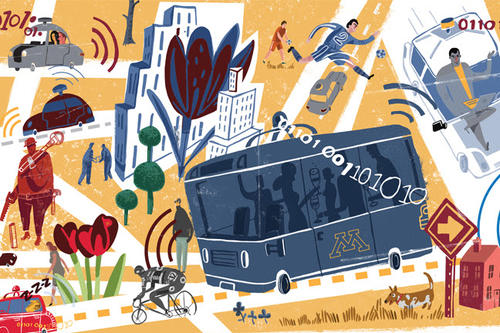
In October, a team of researchers led by Zhi-Li Zhang of the University of Minnesota College of Science and Engineering (CSE) received a $1.75 million grant from the NSF to study the potential impact of autonomous vehicles (AVs) on communities.
Faculty involved in the project come from CSE, the Center for Transportation Studies (CTS) as well as the College of Design, and Humphrey School.
Here are some of the ways researchers believe AVs will affect us.
1. You probably won’t own a vehicle
“If you mention self-driving cars to most people, they think, ‘Oh great, the next car I buy is going to cost $10,000 more,’” says Frank Douma, a CTS research fellow and director of the Humphrey School’s State and Local Policy Program. “In reality, they may not have to buy one at all.” Douma and others believe it’s more likely we’ll pay per trip or through a subscription service.
2. The cloud will steer
AVs will eliminate traffic congestion by replacing human decisions with a cloud-based commuter system. “These cloud systems have the potential to bring about far-reaching changes,” Zhang says. But who would be responsible for the system, its data, and the safety of users?
3. Flowers might grow in the streets, and parking lots could vanish
Because AV technology is so precise, the width of roads could be reduced, says Tom Fisher, director of the U of M’s Minnesota Design Center. That will mean more space for bike lanes, walking paths, or even gardens. And since a third of urban land is now used for parking, get ready for more green space. “These cars can go away at night, park themselves outside the city, and then be called back when needed,” says CSE professor Saif Benjaafar.
4. Your car will run your errands
Imagine a world where AVs deliver your groceries, drop the kids at soccer practice, and pick up your dry cleaning. “When I’m not using it, the car can do other things for me,” Benjaafar says. “It’s going to unleash a lot of hours in the day that we’d otherwise spend in traffic.”
5. Everyone will be able to hitch a ride
AVs offer huge benefits to the elderly, disabled people, and others who cannot drive, says Yingling Fan, professor in CTS and the Humphrey School. “Transportation has a direct connection to health,” Fan says.
Fan and others worry, however, that without proper incentives or regulation, some communities, like rural or poorer areas, will be left behind.
The research and analysis generated by the study will guide future leaders and lawmakers in their decision-making.
-------
See the original version of this story, with even more predictions, at Legacy, a publication of the University of Minnesota Foundation.
- Categories:
- Law and Policy





